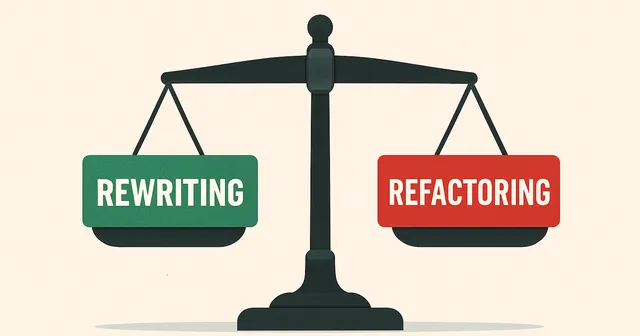Rewriting vs. Refactoring Legacy PHP: Finding the Right Balance

Discover when to rewrite legacy PHP applications from scratch versus incrementally refactoring them. Learn practical strategies for modernizing outdated codebases while maintaining business continuity.
Legacy PHP systems are everywhere in today's business landscape. These applications, often built a decade or more ago, continue to power critical operations despite their aging codebase. When confronted with such systems, development teams face a crucial decision: rewrite from scratch or refactor incrementally?
You can also check our Whitepaper regarding Framework migration.
The Allure of the Complete Rewrite
The "rewrite everything" approach is tempting for several reasons. Starting fresh means freedom from technical debt and outdated design patterns. New projects can leverage contemporary frameworks and best practices from day one. Teams generally prefer building something new over maintaining old code, and technically speaking, a rewrite promises elegant solutions unburdened by historical compromises.
When developers first encounter a legacy PHP application—with its mixed HTML/PHP, global variables, and lack of testing—their instinctive reaction is often: "This needs to be completely rewritten."
The Reality of Rewrites
However, experience teaches some hard lessons about complete rewrites. Rewrites consistently take longer than initially estimated, often by factors of 2-3x. Critical business logic and edge cases can be buried in the old code and easily overlooked. Users expect all existing functionality to work, including obscure features you may not even know exist. Fresh codebases introduce their own bugs, sometimes replacing old problems with new ones. Running parallel systems during transition periods introduces complexity and synchronization challenges that can be overwhelming.
The Pragmatic Middle Path: Strategic Refactoring
A more balanced approach recognizes the value in both preserving what works and improving what doesn't.
Advantages of Incremental Refactoring
With incremental improvements, the system remains operational throughout the process. Changes can be introduced gradually, allowing for course correction as you go. Developers gain deeper understanding of business logic while refactoring existing code. Resources can be focused on the most critical areas first rather than rebuilding everything simultaneously. Stakeholders see continuous improvement rather than waiting for a "big bang" delivery that may or may not arrive on schedule.
Practical Refactoring Strategies
Start by establishing version control if not already in place—this is the essential first step for any improvement plan. Introduce automated testing to verify current behavior before making changes. Begin extracting business logic from the presentation layer gradually. Modernize the PHP version to benefit from performance and security improvements. Apply patterns like dependency injection and MVC structure where they add the most value. Use Docker to ensure consistency between development and production environments.
Finding Your Balance
The optimal approach depends on several factors: How essential is continuous operation of the system? Do you have the team size to support both maintenance and improvement? How complex is the current codebase? What deadlines or business events must be accommodated in your timeline?
When a Rewrite Makes Sense
Despite favoring refactoring in most cases, complete rewrites can be justified when the technology stack is truly obsolete (e.g., PHP 5.3 or earlier), business requirements have fundamentally changed, the application needs to serve dramatically different purposes, or the current architecture simply cannot support essential new features.
Conclusion
The most successful approach to legacy PHP is rarely all-or-nothing. Instead, it involves strategic decisions about which components to refactor, which to rewrite, and which to leave alone for now.
Remember: Those legacy systems, despite their flaws, have been successfully running businesses for years. They deserve respect for their longevity, even as we work to improve them.
What has been your experience with legacy PHP projects? Have you found more success with rewriting or refactoring approaches?
This post was inspired by a discussion on the challenges and realities of working with legacy PHP applications in today's development landscape.







